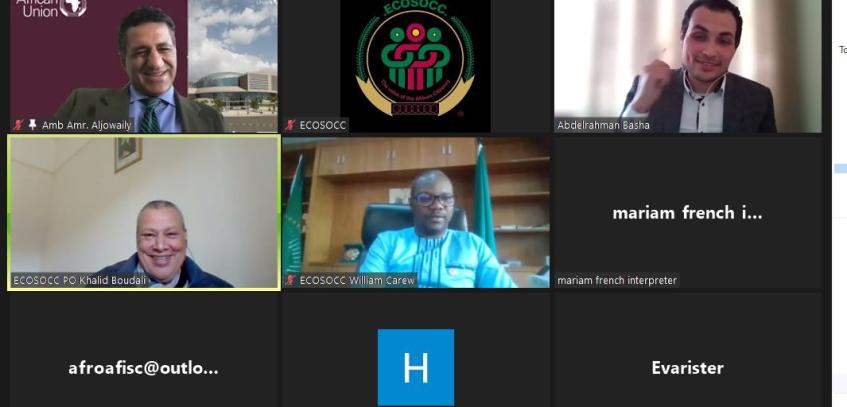The African Union Economic, Social and Cultural Council (ECOSOCC) on 31st January 2023, in collaboration with the Maat for Peace, Development and Human Rights and NGO Major Group for Africa, held an E-Symposium to highlight the role of international and regional partnerships in accelerating sustainable development and the role of civil society organizations (CSOs) in strengthening development partnerships between different sectors.
The E-Symposium was held within the framework of Maat for Peace, Development and Human Rights’ interest in advancing the wheel of sustainable development and on the sidelines of the 2023 Partnership Forum of the United Nations Economic and Social Council (UN ECOSOC), and under the activities of the Cross-Cutting Programs Cluster Committee of AU ECOSOCC.
Interlinking Agenda 2063 and Agenda 2030
In addition to the upcoming UN ECOSOC 2023 Partnership Forum, the conversation was driven by the reality that the United Nations Sustainable Development Goals (SDGs) of Agenda 2030 are aligned with the 20 goals of Agenda 2063. For example, Goal 1 of Agenda 2063 (a high standard of living, quality of life and well-being for all citizens) is linked to Goals 1, 2, 8 and 11 of the SDGs.
However, while the scope of the SDGs is limited to social, economic and environmental dimensions, Agenda 2063 is broader in scope, and includes social, economic and sustainability considerations in the broad context, political, cultural and other African priorities.
During the E-Symposium, Mr. William Carew (Head of ECOSOCC Secretariat) stated that Africa would fulfill its global commitments under the SDGs, if Agenda 2063 was fully implemented.
Based on the alignment (of Agenda 2063 and the SDGs), Mr. Carew believes that both development agendas can be easily implemented, at the national level, through the establishment of relevant and effective partnerships.
Towards Agenda 2063 and Agenda 2030: Partnerships for Sustainable Development
Mr. Ayman Okeil (CEO of Maat for Peace, Development and Human Rights and Chair of the ECOSOCC Cross-Cutting Programs Cluster Committee) posited a formal partnership between AU ECOSOCC and UN ECOSOC since their respective development agendas were aligned. Furthermore, both organs are tasked with championing their respective development agendas.
It is key to note that both Agenda 2063 and Agenda 2030 call for partnerships between all sectors of society: Goal 19 (Africa as a major partner in global affairs and peaceful co-existence) of Agenda 2063 and Goal 17 (strengthen the means of implementation and revitalize the global partnership for sustainable development) of the SDGs.
A recent example of international and regional partnerships aimed at the full implementation of Agenda 2063 includes the partnership between the African Union, the African Development Bank Group and Africa50 and several global partners. These partnerships will help scale and accelerate financing for green infrastructure projects in Africa.
Here is a comprehensive list of AU-international and -regional partnerships for sustainable development.
UN Agenda 2030 has a dedicated “Partnership Platform”, a global registry of voluntary commitments and multi-stakeholder partnerships made by stakeholders to accelerate the implementation of the SDGs.
Cooperation with both AU ECOSOCC and UN ECOSOC will provide civil society organizations, at the country level, the opportunity to assume leadership of the programs aimed at achieving Agenda 2063 and the SDGs.
The Role of Civil Society in the Implementation of Agenda 2063 and Agenda 2030
Highlighting the immense contributions civil society could make towards the implementation of both agendas, Amb. Amr Aljowaily (Strategic Advisor to the Deputy Chairperson of the African Union Commission) encouraged CSOs to read over the AU-UN framework for the implementation of Agenda 2063 as it was an excellent framework document to see how civil society and other stakeholders could contribute to the implementation of both Agenda 2063 and the global Agenda 2030.
CSOs play an important role in the evaluation and reformulation processes: by monitoring and measuring key sustainable development performance indicators.
Towards Agenda 2063 and Agenda 2030: Africa’s Interests at Heart
Abdelrahman Basha (Partnership for Transparency) highlighted that partnerships had become imperative for African societies, noting that 41 countries around the world would review their voluntary national reports during the 2023 High-Level Political Forum, seven of which are African countries.





